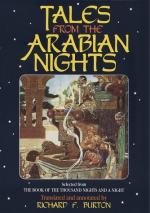[FN#150] This anecdote, which reads like truth, is ample set-off for a cart-load of abuse of women. But even the Hindu, determined misogynists in books, sometimes relent. Says the Katha Sarit Sagara: “So you see, King, honourable matrons are devoted to their husbands, and it is not the case that all women are always bad” (ii. 624). Let me hope that after all this Mistress Su’ad did not lead her husband a hardish life.
[FN#151] Al-Khali’a has been explained in vol. i. 311 {Vol 1, FN#633}: the translation of Al-Mas’udi (vi. 10) renders it “scelerat.” Abu Ali al-Husayn the Wag was a Bassorite and a worthy companion of Abu Nowas the Debauchee; but he adorned the Court of Al-Amin the son not of Al-Rashid the father.
[FN#152] Governor of Bassorah, but not in Al-Husayn’s day
[FN#153] The famous market-place where poems were recited, mentioned by Al-Hariri.
[FN#154] A quarter of Bassorah.
[FN#155] Capital of Al-Yaman, and then famed for its leather and other work (vol. v. 16).
[FN#156] The creases in the stomach like the large navel are always insisted upon. Says the Katha (ii. 525) “And he looked on that torrent river of the elixir of beauty, adorned with a waist made charming by those wave-like wrinkles,” etc.
[FN#157] Arab. Sabaj (not Sabah, as the Mac. Edit. misprints it): I am not sure of its meaning.
[FN#158] A truly Arab conceit, suggesting
The music breathing from her face;
her calves moved rhythmically, suggesting the movement and consequent sound of a musical instrument.
[FN#159] The morosa voluptas of the Catholic divines. The Sapphist described in the text would procure an orgasm (in gloria, as the Italians call it) by biting and rolling over the girl she loved; but by loosening the trouser-string she evidently aims at a closer tribadism the Arab " Musahikah.”
[FN#160] We drink (or drank) after dinner, Easterns before the meal and half-Easterns (like the Russians) before and after. We talk of liquor being unwholesome on an empty stomach; but the truth is that all is purely habit. And as the Russian accompanies his Vodka with caviare, etc., so the Oriental drinks his Raki or Mahaya (Ma al-hayat=aqua vitae) alternately with a Salatah, for whose composition see Pilgrimage i. 198. The Eastern practice has its advantages: it awakens the appetite, stimulates digestion and, what Easterns greatly regard, it is economical; half a bottle doing the work of a whole. Bhang and Kusumba (opium dissolved and strained through a pledges of cotton) are always drunk before dinner and thus the “jolly” time is the preprandial, not the postprandial.
[FN#161] “Abu al-Sakha” (pronounced Abussakha) = Father of munificence.
[FN#162] ’Arab. “Shammara,” also used for gathering up the gown, so as to run the faster.
[FN#163] i.e., blessing the Prophet and all True Believers (herself included).




